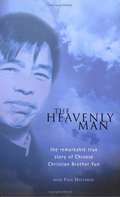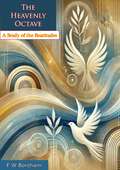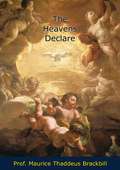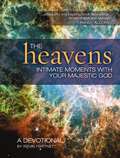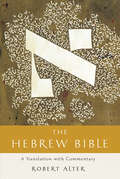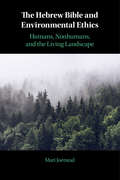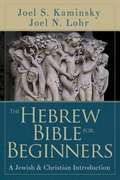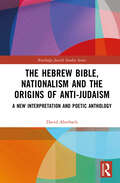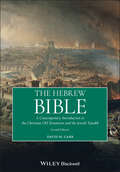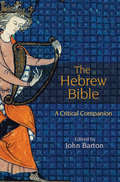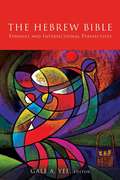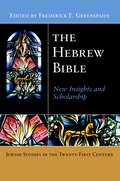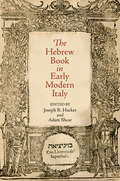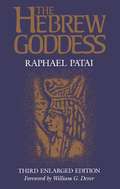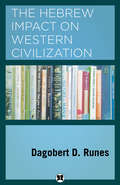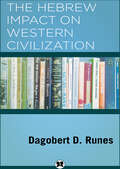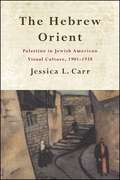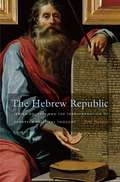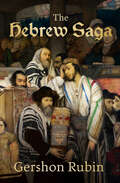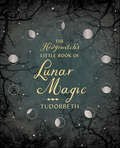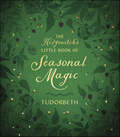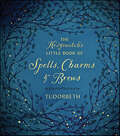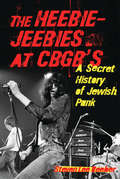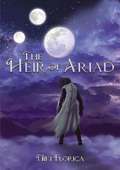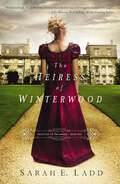- Table View
- List View
The Heavenly Man
by Brother Yun Paul HattawayThe simple fact that the Chinese church has grown into a force tens of millions strong today is a sign not only of God's existence but also of his matchless power
The Heavenly Octave: A Study Of The Beatitudes 1936
by F W BorehamEmbark on a profound spiritual journey with F. W. Boreham’s enlightening work, "The Heavenly Octave: A Study of the Beatitudes." This insightful book delves into the heart of Jesus' Sermon on the Mount, offering a thoughtful and enriching exploration of the Beatitudes—those timeless blessings that encapsulate the essence of Christian living.F. W. Boreham, a revered preacher and author known for his eloquent prose and deep spiritual insight, masterfully unpacks the layers of meaning within each of the eight Beatitudes. With a blend of scholarly analysis and practical application, Boreham brings these ancient teachings to life, showing how they offer a blueprint for a fulfilling and God-centered life."The Heavenly Octave" examines each Beatitude in detail, exploring its theological significance, historical context, and relevance to contemporary believers. Boreham’s reflections are infused with his characteristic warmth and wisdom, making complex theological concepts accessible and engaging. Through vivid illustrations and poignant anecdotes, he connects the teachings of Jesus to everyday experiences, helping readers to see the Beatitudes not just as lofty ideals but as practical principles for living a blessed life.This book is an essential read for anyone seeking to deepen their understanding of the Christian faith and grow in their spiritual walk. Whether you are a seasoned believer or new to the teachings of Jesus, "The Heavenly Octave" provides valuable insights that will inspire and challenge you to live out the Beatitudes in your daily life.F. W. Boreham's "The Heavenly Octave: A Study of the Beatitudes" is more than a theological treatise; it is a spiritual companion that guides readers toward a deeper relationship with God. Its enduring appeal lies in its ability to speak to the heart, offering timeless wisdom and practical guidance for anyone striving to live in accordance with the teachings of Jesus.Allow "The Heavenly Octave" to enrich your spiritual journey, providing you with the understanding and inspiration needed to embrace the blessings of the Beatitudes and reflect them in your life. F. W. Boreham's profound study is sure to become a cherished addition to your spiritual library.
The Heavens Declare
by Prof. Maurice Thaddeus BrackbillIf you thrill at the sight of the heavenly blue backdrop with innumerable silver stars twinkling at you so far below on the spinning earth, come, draw up your chair and share this book. This book is written to give the reader a greater appreciation of the stars in the heavens, and of the God who created them.“With humor and whimsy and inspiration, and with scientific acceptability that heightens these other qualities, Maurice T. Brackbill shares his viewpoint of the heavens in this delightful series of essays. Through everything he writes shines his deep feeling for the eternal and universal meanings behind the sensible reality.“Professor Brackbill’s book is in your hands. You will read it, and will reread it to others, and you’ll reread it to yourself, time and time again. Preachers will find in this volume the texts for many sermons, kindergarten teachers will discover that the thinking fits into the capability of the youngest mind, and the student will recognize the sound science which mantles every vivid paragraph. Everyone who reads will sense and approve the deep spiritual motivation which underlies the science.”—ARMAND N. SPITZ
The Heavens: Intimate Moments with Your Majestic God
by Kevin HartnettSovereign in purpose, infinitely powerful, and transcendent over all He has made, God is equally infinite in grace and mercy. He knows and cares about your every need. The Heavens provides a unique and extraordinary opportunity to soar above the distractions and burdens of life as one meets with, and worships the Creator of the universe. Over 100 fascinating devotions with stunning images, insightful and Biblical commentary, stirring poetry, and perfectly chosen scriptures are integrated around clearly presented topics in astronomy. A toolbox and jewel box combined, the Heavens both equips and inspires the soul to know and love God.
The Hebrew Bible (Vol. Three-Volume Set): A Translation With Commentary
by Robert AlterA landmark event: the complete Hebrew Bible in the award-winning translation that delivers the stunning literary power of the original. A masterpiece of deep learning and fine sensibility, Robert Alter’s translation of the Hebrew Bible, now complete, reanimates one of the formative works of our culture. Capturing its brilliantly compact poetry and finely wrought, purposeful prose, Alter renews the Old Testament as a source of literary power and spiritual inspiration. From the family frictions of Genesis and King David’s flawed humanity to the serene wisdom of Psalms and Job’s incendiary questioning of God’s ways, these magnificent works of world literature resonate with a startling immediacy. Featuring Alter’s generous commentary, which quietly alerts readers to the literary and historical dimensions of the text, this is the definitive edition of the Hebrew Bible.
The Hebrew Bible and Environmental Ethics: Humans, NonHumans, and the Living Landscape
by Mari JoerstadThe environmental crisis has prompted religious leaders and lay people to look to their traditions for resources to respond to environmental degradation. In this book, Mari Joerstad contributes to this effort by examining an ignored feature of the Hebrew Bible: its attribution of activity and affect to trees, fields, soil, and mountains. The Bible presents a social cosmos, in which humans are one kind of person among many. Using a combination of the tools of biblical studies and anthropological writings on animism, Joerstad traces the activity of non-animal nature through the canon. She shows how biblical writers go beyond sustainable development, asking us to be good neighbors to mountains and trees, and to be generous to our fields and vineyards. They envision human communities that are sources of joy to plants and animals. The Biblical writers' attention to inhabited spaces is particularly salient for contemporary environmental ethics in their insistence that our cities, suburbs, and villages contribute to flourishing landscapes.
The Hebrew Bible for Beginners: A Jewish & Christian Introduction
by Joel S. Kaminsky Joel N. LohrJews call the Hebrew Scriptures the "Tanakh" and Christians call them the "Old Testament." It doesn't take long to see that Jews and Christians view the same set of books differently and interpret these scriptures in unique and at times conflicting ways. The Hebrew Bible for Beginners introduces students to the tremendous influence the Hebrew Bible has had on western society for over two millennia and explores the complexities of reading ancient religious literature today. The book also addresses how certain modern critical approaches may initially be alarming, indeed even shocking, to those who have not been exposed to them, but it tackles the conversation in a respectful fashion. Avoiding jargon and convoluted prose, this highly accessible volume provides textboxes, charts, a timeline, a glossary, and regularly includes artistic renderings of biblical scenes to keep lay and beginning readers engaged.this highly accessible volume provides textboxes, charts, a timeline, a glossary, and regularly includes artistic renderings of biblical scenes to keep lay and beginning readers engaged.
The Hebrew Bible, Nationalism and the Origins of Anti-Judaism: A New Interpretation and Poetic Anthology (Routledge Jewish Studies Series)
by David AberbachIn the attempts to unify divided peoples on the basis of a shared past, both historical and mythical, this book illumines aspects of cultural nationalism common since the Middle Ages. As an edited work, the Bible includes texts mostly depicting long-gone historical eras extending over several centuries. Following on from Aberbach’s previous work National Poetry, Empires, and War, this book argues that works of this nature – notably the Mujo-Halil songs in Albania, the Irish stories of Cuchulain, the songs of the Nibelungen in Germany, or the Finnish legends collected in The Kalevala – have an ancient precedent in the Hebrew Bible (to which national literatures often allude and refer), a subject largely neglected in biblical studies. The self-critical element in the Hebrew Bible, common in later national literature, is examined as the basis of later anti-Semitism, as the Bible was not confined to Jews but was adopted in translation by many other national groups. With several dozen original translations from the Hebrew, this book highlights how the Bible influenced and was distorted by later national cultures. Written without jargon, this book is intended for the general reader, but is also an important contribution to the study of the Bible, nationalism, and Jewish history.
The Hebrew Bible: A Contemporary Introduction to the Christian Old Testament and the Jewish Tanakh
by David M. CarrDiscover the historical and social context of one of the most influential works ever written with this authoritative new resource The newly revised second edition of The Hebrew Bible: A Contemporary Introduction to the Christian Old Testament and Jewish Tanakh delivers a brief and up-to-date introduction to the Hebrew Bible/Old Testament in the broader context of world history. Its treatment of the formation of the Bible amidst different historical periods allows readers to understand the biblical texts in context. It also introduces readers to scholarly methods used to explore the formation of the Hebrew Bible and its later interpretation by Jews and Christians. Written by a leading scholar in the field, this new edition incorporates the most recent research on the archaeology and history of early Israel, the formation of the Pentateuch, and the development of the historical and poetic books. Students will benefit from the inclusion of study questions in each chapter, focus texts from the Bible that illustrate major points, timelines, illustrations, photographs and a glossary to help them retain knowledge. The book also includes: A deepened and up-to-date focus on recent methods of biblical study, including trauma studies, African American, womanist, and ecocritical approaches to the Bible An orientation to multiple bibles, translations and digital resources for study of the Bible An exploration of the emergence of ancient Israel, its first oral traditions and its earliest writings Discussions of how major features of the Bible reflect communal experiences of trauma and resilience as Israel survived under successive empires of the Ancient Near East. Fuller treatment of the final formation of biblical books in early Judaism, including coverage of diverse early Jewish texts (e.g. Ben Sira, Enoch, Judith) that were revered as scripture before there were more clearly defined Jewish and Christian Bibles Designed for students of seminary courses and undergraduate students taking an introduction to the Hebrew Bible/Old Testament, this second edition of The Hebrew Bible also will interest general readers with interest in the formation of the Bible.
The Hebrew Bible: A Critical Companion
by John BartonThis book brings together some of the world's most exciting scholars from across a variety of disciplines to provide a concise and accessible guide to the Hebrew Bible. It covers every major genre of book in the Old Testament together with in-depth discussions of major themes such as human nature, covenant, creation, ethics, ritual and purity, sacred space, and monotheism. This authoritative overview sets each book within its historical and cultural context in the ancient Near East, paying special attention to its sociological setting. It provides new insights into the reception of the books and the different ways they have been studied, from historical-critical enquiry to modern advocacy approaches such as feminism and liberation theology. It also includes a guide to biblical translations and textual criticism and helpful suggestions for further reading.Featuring contributions from experts with backgrounds in the Jewish and Christian faith traditions as well as secular scholars in the humanities and social sciences, The Hebrew Bible is the perfect starting place for anyone seeking a user-friendly introduction to the Old Testament, and an invaluable reference book for students and teachers.
The Hebrew Bible: Feminist and Intersectional Perspectives
by Gale A. YeeThis volume provides an introduction and essays on the four key sections of the Hebrew Scriptures from the perspective of top feminist biblical scholars: <p><p> Part One: Torah/Pentateuch <p> Part Two: Deuteronomistic History (Joshua 2 Kings) <p> Part Three: Prophets and Prophecy <p> Part Four: Writings and the Book of Daniel <p> This volume highlights key issues in the Hebrew Scriptures from the perspective of top feminist biblical scholars. This includes historical critical and literary textual analysis and exegesis, particularly as viewed through feminist and intersectional interpretive lenses. Intersectional lenses include the racial/ethnic, class, Global South, postcolonial, and so forth, and their interconnections with gender. <p> The introduction to the volume by the editor introduces feminist intersectional biblical scholarship, making the case that this scholarship addresses perspectives that are often missing from even very thorough survey texts: feminist and intersectional issues regarding the women characters, sexual assumptions, sexual and domestic violence, symbolization of women, class and race relations, and so forth. <p> The essays have been created for students who may be encountering feminist biblical and intersectional scholarship for the first time. <p> Other contributors to this volume include Carolyn J. Sharp, Vanessa Lynn Lovelace, Corrine L. Carvalho, Melody Knowles, and Judy Fentress-Williams.
The Hebrew Bible: New Insights and Scholarship (Jewish Studies in the Twenty-First Century #4)
by Frederick E. GreenspahnIn April of 2001, the headline in the Los Angeles Times read, “Doubting the Story of the Exodus.” It covered a sermon that had been delivered by the rabbi of a prominent local congregation over the holiday of Passover. In it, he said, “The truth is that virtually every modern archeologist who has investigated the story of the exodus, with very few exceptions, agrees that the way the Bible describes the exodus is not the way it happened, if it happened at all.” This seeming challenge to the biblical story captivated the local public. Yet as the rabbi himself acknowledged, his sermon contained nothing new. The theories that he described had been common knowledge among biblical scholars for over thirty years, though few people outside of the profession know their relevance.New understandings concerning the Bible have not filtered down beyond specialists in university settings. There is a need to communicate this research to a wider public of students and educated readers outside of the academy. This volume seeks to meet this need, with accessible and engaging chapters describing how archeology, theology, ancient studies, literary studies, feminist studies, and other disciplines now understand the Bible.
The Hebrew Book in Early Modern Italy (Jewish Culture and Contexts)
by Joseph R. Hacker Adam ShearThe rise of printing had major effects on culture and society in the early modern period, and the presence of this new technology—and the relatively rapid embrace of it among early modern Jews—certainly had an effect on many aspects of Jewish culture. One major change that print seems to have brought to the Jewish communities of Christian Europe, particularly in Italy, was greater interaction between Jews and Christians in the production and dissemination of books.Starting in the early sixteenth century, the locus of production for Jewish books in many places in Italy was in Christian-owned print shops, with Jews and Christians collaborating on the editorial and technical processes of book production. As this Jewish-Christian collaboration often took place under conditions of control by Christians (for example, the involvement of Christian typesetters and printers, expurgation and censorship of Hebrew texts, and state control of Hebrew printing), its study opens up an important set of questions about the role that Christians played in shaping Jewish culture.Presenting new research by an international group of scholars, this book represents a step toward a fuller understanding of Jewish book history. Individual essays focus on a range of issues related to the production and dissemination of Hebrew books as well as their audiences. Topics include the activities of scribes and printers, the creation of new types of literature and the transformation of canonical works in the era of print, the external and internal censorship of Hebrew books, and the reading interests of Jews. An introduction summarizes the state of scholarship in the field and offers an overview of the transition from manuscript to print in this period.
The Hebrew Goddess
by Raphael Patai William G. DeverThe Hebrew Goddess demonstrates that the Jewish religion, far from being pure monotheism, contained from earliest times strong polytheistic elements, chief of which was the cult of the mother goddess. Lucidly written and richly illustrated, this third edition contains new chapters of the Shekhina.
The Hebrew Impact on Western Civilization
by Dagobert D. RunesAn eye-opening classic volume on the enduring cultural impact of the Jewish people This authoritative work considers the creative and cultural influence of the Jews throughout our time. At more than 800 pages, D. D. Runes has complied a mid-twentieth century account of the various contributions in many spheres in which the Jews have had an impact on western civilization. Eminent scholars consider the ways in which the Jews contributed toward the making of modern society and helped in raising human standards and values. Richard Van Dyck, in "The Jewish Influence on Journalism," observes that the preponderance of Jewish newspapermen disproves the commonly held belief that Jewish journalism is "necessarily subversive." William B. Ziff's "The Jew as Soldier, Strategist and Military Adviser" delineates the successes of Jewish military forces throughout history. Dr. Abraham I. Katsh discusses "The Hebraic Foundations of American Democracy," noting the influence of Hebrew Scriptures on standards of conduct in western civilization. Curtis Lubinski's "The Jew in Drama, Theatre, and Film" traces the success of Jewish performers and dramatists. The essays compiled in this volume are a fascinating and expansive look at the far-reaching impact Jews have had on Western life.
The Hebrew Impact on Western Civilization
by Dagobert D. RunesThis wide-ranging anthology examines the enduring cultural impact of the Jewish people and their many contributions to the creation of modern society.Edited by philosopher and intellectual historian Dagobert D. Runes, The Hebrew Impact on Western Civilization is a scholarly and authoritative account of the many spheres in which the Jews have impacted Western civilization. A diverse collection of eminent scholars consider how the Jews altered the course of the contemporary world and helped raise the standard of human values. William B. Ziff&’s &“The Jew as Soldier, Strategist and Military Adviser&” delineates the successes of Jewish military forces throughout history. Dr. Abraham I. Katsh discusses the &“Hebraic Foundations of American Democracy,&” noting the influence of Hebrew Scriptures on standards of conduct in western civilization. These and other essays offer a fascinating and expansive look at the far-reaching impact Jews have had on Western life.
The Hebrew Orient: Palestine in Jewish American Visual Culture, 1901-1938
by Jessica L. CarrIn the decades before the establishment of the State of Israel, striking images of Palestine circulated widely among Jewish Americans. These images visualized "the Orient" for American viewers, creating the possibility for Jewish Americans to understand themselves through imagining "Oriental" counterparts. In The Hebrew Orient, Jessica L. Carr shows how images of the Holy Land made Jewish Americans feel at home in the United States by imagining "the Orient" as heritage. Carr's analyses of periodicals from Hadassah and the Zionist Organization of America, art calendars from the National Federation of Temple Sisterhoods, the Jewish Encyclopedia, and the Jewish exhibit at the 1933 World's Fair are richly illustrated. What emerges is a new understanding of the place of Orientalism in American Zionism. Creating a narrative about their origins, Jewish Americans looked east to understand themselves as Westerners.
The Hebrew Republic: Jewish Sources and the Transformation of European Political Thought
by Eric NelsonAccording to a commonplace narrative, the rise of modern political thought in the West resulted from secularization the exclusion of religious arguments from political discourse. But in this pathbreaking work, Eric Nelson argues that this familiar story is wrong. Instead, he contends, political thought in early-modern Europe became less, not more, secular with time, and it was the Christian encounter with Hebrew sources that provoked this radical transformation. During the sixteenth and seventeenth centuries, Christian scholars began to regard the Hebrew Bible as a political constitution designed by God for the children of Israel. Newly available rabbinic materials became authoritative guides to the institutions and practices of the perfect republic. This thinking resulted in a sweeping reorientation of political commitments. In the book s central chapters, Nelson identifies three transformative claims introduced into European political theory by the Hebrew revival: the argument that republics are the only legitimate regimes; the idea that the state should coercively maintain an egalitarian distribution of property; and the belief that a godly republic would tolerate religious diversity. One major consequence of Nelson s work is that the revolutionary politics of John Milton, James Harrington, and Thomas Hobbes appear in a brand-new light. Nelson demonstrates that central features of modern political thought emerged from an attempt to emulate a constitution designed by God. This paradox, a reminder that while we may live in a secular age, we owe our politics to an age of religious fervor, in turn illuminates fault lines in contemporary political discourse.
The Hebrew Saga
by Gershon RubinA personal and philosophical meditation on the Hebrew Bible, its stories, and its sages.In this volume, Gershon Rubin attempts to draw the secrets of the antediluvian world into the modern day. Through the lens of a lifetime of spiritual learning, he explores the ancient saga of creation, Adam and Eve, and the generations to come after. As Rubin states by way of introduction to The Hebrew Saga, &“My first name, Gershon, is similar to the Greek word geron (old man). Thus through my &‘geronoscope,&’ I view the over-four-thousand-year-long written history of the Hebrew nation, which resulted in the origination of this my world-view, or world outlook.&”
The Hedgewitch's Little Book of Lunar Magic (The Hedgewitch's Little Library)
by TudorbethAs a central figure of the Craft, the moon holds a special place in any hedgewitch's practice. Through more than a hundred spells, recipes, and workings, this two-color, hardcover book shows you how to honor Our Lady of the Night and utilize her power to amplify your magic and affirmations.Discover lunar myths and legends as well as correspondences to herbs, crystals, and deities. You will also learn how to connect with changing energies in each season and moon phase. With guidance for drawing down the moon, making moon water, creating a moon altar, and other sacred activities, The Hedgewitch's Little Book of Lunar Magic features ample inspiration for honoring and harmonizing with this revered celestial body.
The Hedgewitch's Little Book of Seasonal Magic
by TudorbethOver 100 Recipes, Spells & Crafts to Connect with Seasonal EnergiesPlants, wildlife, the environment, and even weather phenomena are sacred to the hedgewitch. This beautiful book follows the sun around its seasonal year, providing more than a hundred recipes, spells, potions, and crafts to help you reconnect with natural and elemental energies. You'll enjoy recipes for jams, jellies, chutneys, and syrups as well as spells, Esbat rituals, and correspondences for each of the seasons. Tudorbeth shares enchantments for safe travels, luck, preventing floods, increased passion, and many other purposes. From winter spice marmalade to Mabon apple garland, this hands-on book helps strengthen your magic as you travel through the Wheel of the Year.
The Hedgewitch's Little Book of Spells, Charms & Brews (The Hedgewitch's Little Library)
by TudorbethExplore old-world magic and contemporary charms with this brilliant book of enchantments. Within these pages, you will discover more than one hundred spells, charms, and recipes for love, money, health, family, career, and more. Author Tudorbeth has selected the best traditional workings along with contemporary spells that can be done with readily available ingredients.Hedgewitchery is the individual pursuit of living in harmony with nature while practicing magic. This book shares everything from old-world spells to magical enchantments for modern problems like credit card issues and unwanted house guests. You will discover delicious recipes such chocolate avocado mousse and charms and spells for prosperity, good luck, fertility, friendships, and so much more. All of the spells can be modified to suit your own individual needs and feelings, and the author includes helpful suggestions for incorporating herbs, crystals, and oils to empower your magic.
The Heebie-Jeebies at CBGB's: A Secret History of Jewish Punk
by Steven BeeberBased in part on the recent interviews with more than 125 people --among them Tommy Ramone, Chris Stein (Blondie), Lenny Kaye (Patti Smith Group), Hilly Kristal (CBGBs owner), and John Zorn--this book focuses on punk's beginnings in New York City to show that punk was the most Jewish of rock movements, in both makeup and attitude. As it originated in Manhattan's Lower East Side in the early 1970s, punk rock was the apotheosis of a Jewish cultural tradition that found its ultimate expression in the generation born after the Holocaust. Beginning with Lenny Bruce, "the patron saint of punk," and following pre-punk progenitors such as Lou Reed, Jonathan Richman, Suicide, and the Dictators, this fascinating mixture of biography, cultural studies, and musical analysis delves into the lives of these and other Jewish punks--including Richard Hell and Joey Ramone--to create a fascinating historical overview of the scene. Reflecting the irony, romanticism, and, above all, the humor of the Jewish experience, this tale of changing Jewish identity in America reveals the conscious and unconscious forces that drove New York Jewish rockers to reinvent themselves--and popular music.
The Heir of Ariad
by Niki FloricaThe weight of a vanished father's legacy and the secrets of the past have forced Kyrian to carve a place among his people at the price of his own sweat and blood. Ariad is withering. The Skies seem a strange place to die of thirst, but no one can fetch the Rains against the tyrant king's will, and no one but the Creator who has vanished into legend can kill an invisible king.But there is a force at work beyond Kyrian's sight. A powerful, masterful will. Suddenly there is blood on his hands, the Skies are filled with enemies, and the only way to escape a dark end is to flee the clouds forever. But there in the Lands waits a powerful prophecy, along with a powerful weapon, and now as Ariad withers to dust all hope may rest with the one young mortal who fled his home a fugitive and must return to it a king.
The Heiress of Winterwood: The Heiress Of Winterwood, The Headmistress Of Rosemere, A Lady At Willowgrove Hall (Whispers On The Moors #1)
by Sarah LaddDarbury, England, 1814Amelia Barrett gave her word. Keeping it could cost her everything.Amelia Barrett, heiress to an estate nestled in the English moors, defies family expectations and promises to raise her dying friend's baby. She'll risk everything to keep her word--even to the point of proposing to the child's father--a sea captain she's never met.When the child vanishes with little more than an ominous ransom note hinting at her whereabouts, Amelia and Graham are driven to test the boundaries of their love for this little one.Amelia's detailed plans would normally see her through any trial, but now, desperate and shaken, she's forced to examine her soul and face her one weakness: pride.Graham's strength and self-control have served him well and earned him much respect, but chasing perfection has kept him a prisoner of his own discipline. And away from the family he has sworn to love and protect.Both must learn to have faith and relinquish control so they can embrace the future ahead of them."My kind of book! [It] grabbed my attention from the first lines and I eagerly returned to its pages." --Julie Klassen, Best-Selling, Award-Winning Author"If you are a fan of Jane Austen and Jane Eyre, you will love Sarah E. Ladd's debut." --USAToday.com
